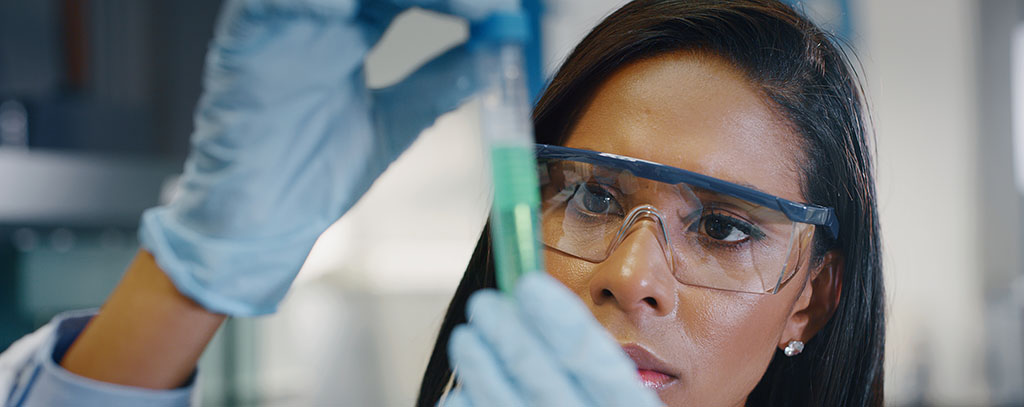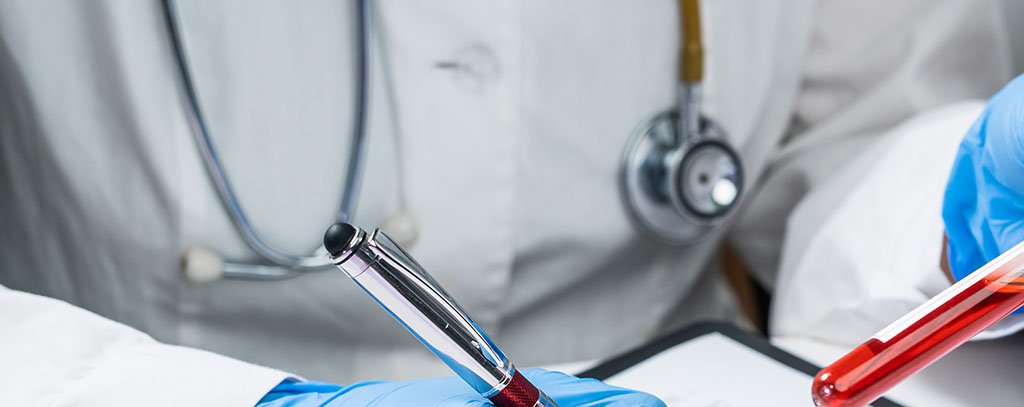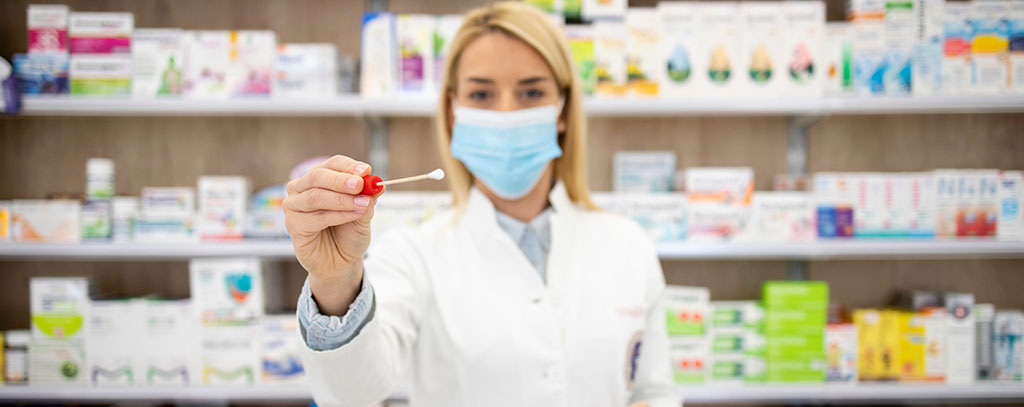


Does Methadone Show Up on a 10 Panel Drug Test? Explained
May 17, 2023


Saliva Drug Tests for Pre-Employment Screening Essentials
May 21, 2023Saliva drug tests for employers have become an increasingly popular choice in maintaining a safe and productive work environment. As the requirement for reliable and efficient drug testing techniques continues to rise, it is vital for firms to comprehend the various options accessible. This blog post will provide an in-depth look at oral fluid drug testing, its benefits, accuracy, regulations surrounding its use, and how to choose the right supplier.
In this comprehensive guide on saliva drug tests for employers, we will discuss what constitutes a saliva drug test and how it works. We'll also explore the types of drugs that can be detected through this method. In addition, we'll explore the cost-effectiveness, convenience and non-invasive collection procedures of oral fluid testing over traditional urine tests to understand their advantages.
Finally, we'll delve into important considerations such as accuracy limitations and detection windows for different drugs while addressing legal requirements and privacy concerns associated with workplace testing programs. By understanding these factors thoroughly when selecting a supplier or implementing your own program you can ensure compliance with industry standards while fostering a safer work environment.
Table of contents
- Rapid Results with Saliva Drug Tests
- Compliance with Federal and State Regulations
- Tamper-Resistant Oral Fluid Collection Process
- Short Detection Window Focused on Workplace Safety
- Growing Interest Among Private Companies
- Department of Transportation's Consideration
- Cost-effective Drug Testing Solution
- Improved Employee Privacy during Collection Process
- Versatility in Detecting Common Drugs
- Proactive Intervention Strategies
- Frequently Asked Questions Saliva Drug Tests for Employers
- Conclusion
Rapid Results with Saliva Drug Tests
Compared to urine tests which can detect substances for up to four days after use, saliva drug test results come back in just ten to fifteen minutes. This quick turnaround time allows employers to make informed decisions regarding employee substance abuse and workplace safety more efficiently.
Faster Decision-Making Process for Employers
The speed of oral fluid drug testing provides a significant advantage over traditional lab-based urine drug testing methods. With faster results, employers can take appropriate action sooner, whether it's addressing potential issues with an impaired employee or ensuring that job candidates meet the company's standards for a safe workplace.
- Actionable information within minutes instead of hours or days
- Prompt intervention when necessary, reducing risks associated with delayed response times
- Better decision-making capabilities based on accurate and timely data
Reduced Waiting Time Compared to Traditional Urine Testing
In addition to facilitating quicker decision-making processes, oral fluid testing also reduces the waiting time often associated with laboratory-based urine drug testing. The elimination of long wait times not only benefits employers but also helps maintain productivity levels by minimizing disruptions caused by lengthy off-site collection procedures.
- No need for employees to leave work premises during sample collection process
- Avoidance of unnecessary delays in receiving test results due to transportation and processing at external labs
- Emphasis on maintaining regular workflow without compromising accuracy or efficiency
Overall, the rapid results offered by saliva drug tests make them an ideal choice for employers looking to implement or update their drug-free workplace testing programs. By providing accurate and timely information, these tests enable companies to maintain a safe working environment while minimizing disruptions caused by traditional urine drug testing methods.
Rapid Results with Saliva Drug Tests provide employers a faster decision-making process and reduce waiting time compared to traditional urine testing. Moving on, Compliance with Federal and State Regulations ensures proper procedures are followed when conducting drug tests.
Compliance with Federal and State Regulations
Employers who intend to conduct drug screens must comply with all relevant federal and state regulations. The Substance Abuse and Mental Health Services Administration (SAMHSA) guidelines establish standards and technical requirements for oral fluid collection devices/methods while addressing the issue of cheating during urine-based screenings.
SAMHSA Guidelines Ensure Proper Testing Procedures
The SAMHSA guidelines provide a comprehensive framework for employers to follow when implementing an oral fluid testing program. By adhering to these recommendations, companies can be confident that their drug testing procedures are both legally compliant and effective in detecting employee substance abuse. Strict compliance with these guidelines is essential to ensure a secure workplace and prevent any legal repercussions.
Adherence to Legal Requirements When Conducting Drug Tests
- Federal laws: Employers should be aware of federal regulations such as the Department of Transportation's Part 40 Rule, which governs workplace drug testing programs for safety-sensitive positions within transportation industries.
- State laws: Companies must also consider any applicable state-specific rules governing workplace drug testing, including those related to medical marijuana use or other specific drugs included on an employer's testing panel.
- Court decisions: It is essential for businesses to stay informed about recent court rulings that may impact their ability to conduct drug tests or enforce consequences based on test results. For example, some courts have ruled against employers who terminated employees solely due to positive marijuana tests without considering whether they were impaired at work (source).
In summary, adhering to federal and state regulations when implementing an oral fluid drug testing program is crucial for maintaining a legally compliant and effective workplace safety strategy. By following SAMHSA guidelines and staying informed about relevant laws, employers can ensure that their drug testing procedures are both accurate and defensible in the eyes of the law.
Adhering to federal and state regulations when conducting drug tests is essential for employers, ensuring that their workplace remains compliant with the law. Tamper-resistant oral fluid collection processes are a great way to reduce sample manipulation or substitution while still being cost effective and time efficient.
Tamper-Resistant Oral Fluid Collection Process
One of the key advantages of oral fluid drug testing is its tamper-resistant collection process. The preferred standard established by the Substance Abuse and Mental Health Services Administration (SAMHSA) involves having employees collect their own samples under employer observation, reducing the likelihood of tampering while saving time and cost associated with off-site collections. Ensuring accurate test results is crucial in maintaining a safe workplace environment.
Reduces Chances of Sample Manipulation or Substitution
The oral fluid collection method minimizes opportunities for employees to manipulate or substitute their samples, which can be an issue with traditional urine drug tests. Since saliva samples are collected under direct supervision, it becomes much more difficult for individuals to cheat on these tests. This increased reliability makes oral fluid testing a valuable tool in any comprehensive drug-free workplace testing program.
Simplified Collection Procedure Saves Time and Resources
- Faster Sample Collection: Collecting saliva samples takes less time than collecting urine specimens since there's no need for private facilities or medical review officers during the process.
- No Specialized Equipment Required: Employers don't need to invest in expensive equipment like they would for laboratory-based urine drug testing methods; instead, simple swabs or absorbent pads are used to collect oral fluids from employees quickly and easily.
- Easier Storage and Transportation: Saliva samples require minimal handling compared to urine specimens, making them easier to store and transport without compromising test accuracy - further contributing towards reduced costs associated with conducting employee substance abuse screenings.
By implementing tamper-resistant oral fluid testing as part of their workplace drug testing program, employers can ensure accurate results while streamlining the process and reducing overall costs. This approach not only promotes a safer work environment but also fosters trust between employees and management by maintaining privacy during sample collection.
The tamper-resistant oral fluid collection process is an effective way to ensure sample integrity, while saving time and resources. With a short detection window focused on workplace safety, employers can quickly detect recent substance use for post-accident or reasonable suspicion situations.
Short Detection Window Focused on Workplace Safety
Oral fluid testing detects drugs soon after ingestion but remains effective for only 24-48 hours post-use, which is a shorter window compared to other methods like urinalysis. This makes it particularly advantageous when conducting reasonable suspicion or post-accident scenarios where ensuring employee safety is of paramount importance due to potential impairment caused by recent consumption rather than historical usage patterns alone.
Immediate Detection of Recent Substance Use
- Rapid results: Saliva drug tests can provide results in as little as ten minutes, allowing employers to take swift action if necessary.
- Sensitivity: Oral fluid testing has been shown to be more sensitive in detecting certain substances, such as THC (the active ingredient in marijuana), compared to urine drug tests. This increased sensitivity allows for the identification of potentially impaired employees who may pose a risk to workplace safety.
Ideal for Post-Accident or Reasonable Suspicion Situations
In cases where an accident has occurred or there is reason to believe that an employee may be under the influence of drugs, saliva drug tests offer several benefits over traditional urine testing. These include:
- Ease of administration: Collecting oral fluids is less invasive and easier than collecting a urine specimen, making it more suitable for emergency situations.
- Faster turnaround time: The quick processing time associated with saliva drug tests means that employers can make informed decisions about how best to handle any incidents involving suspected substance abuse without delay.
- Detection accuracy: Oral fluid tests are designed to detect recent drug use, making them particularly useful in post-accident testing where the focus is on identifying any impaired employees who may have contributed to the incident.
Overall, incorporating saliva drug tests into an employer's drug-free workplace testing program can help create a safer work environment by quickly and accurately identifying potential employee substance abuse issues that could pose a risk to workplace safety. Drug testing has proved to be an effective tool for employers to maintain a drug-free workplace. In fact, drug-free workplace testing programs began in the 1980s, and since then, oral fluid drug testing has become a popular alternative to laboratory-based urine drug testing. Oral fluid testing is also known as oral testing, and it involves collecting a saliva sample from the employee to detect specific drugs included in the employer’s testing panel. Private employers in the US are not required by law to conduct drug testing, but many choose to do so to ensure a safe workplace. The Substance Abuse and Mental Health Services Administration (SAMHSA) provides guidelines for workplace drug testing, including the use of medical review officers to interpret test results and provide assistance to employees who test positive for drugs. Common drugs detected in workplace testing include marijuana, cocaine, amphetamines, and opioids.
The short detection window of saliva drug tests allows employers to quickly and accurately detect recent substance use, making it an ideal tool for workplace safety. As interest in alternative drug testing methods continues to grow among private companies, oral fluid tests are becoming increasingly popular as a reliable option.
Growing Interest Among Private Companies
Many private companies already utilize lab-based urine sampling techniques; however, there has been growing interest in the adoption of oral fluids technology given its similarity to existing processes and ability to identify more immediate instances of substance abuse. This shift towards saliva drug testing is indicative of a larger trend in workplace safety and employee well-being.
Increased Demand for Alternative Drug Testing Methods
- Efficiency: Oral fluid drug testing provides faster results compared to traditional lab-based urine drug tests, making it an attractive option for employers looking to expedite their decision-making process.
- Tamper-resistant: The collection process for saliva samples is less invasive and easier to monitor than that of urine specimens, reducing the likelihood of sample manipulation or substitution.
- Detection accuracy: Saliva tests can accurately detect recent substance use within a shorter window than other methods like urinalysis, ensuring a safer work environment by identifying impaired employees quickly.
Oral Fluid Tests as an Emerging Trend among Employers
The increasing popularity of oral fluid testing among American employers reflects a broader commitment to maintaining safe workplaces free from the risks associated with employee substance abuse. As more companies adopt this method, it becomes increasingly important for businesses considering implementing or updating their own workplace drug testing programs to stay informed about the benefits and best practices surrounding this approach. Resources such as those provided by the Substance Abuse and Mental Health Services Administration (SAMHSA), along with expert guidance from organizations like Halux Diagnostic, can help ensure successful integration into your company's drug-free workplace testing program.
The growing interest among private companies for alternative drug testing methods is indicative of a trend towards oral fluid tests as the preferred method. With this in mind, it's important to consider the potential widespread acceptance by regulatory bodies such as the Department of Transportation and any expert guidance available to assist with implementation.
Department of Transportation's Consideration
The Department of Transportation (DOT) is considering including oral fluid testing as an acceptable workplace drug testing method, which would further validate the benefits and reliability of this approach. This potential change in regulation could have a significant impact on employers who are required to adhere to DOT guidelines for their drug-free workplace testing programs.
Potential Widespread Acceptance by Regulatory Bodies
If the DOT approves oral fluid drug testing, it will likely lead to increased acceptance among other regulatory bodies and industries. This shift towards saliva-based tests demonstrates that they are being recognized as a reliable alternative to traditional laboratory-based urine drug testing methods. The adoption of oral fluid tests by such a prominent organization like the DOT would serve as an endorsement for its effectiveness in detecting employee substance abuse and promoting workplace safety.
Expert Guidance Available to Assist with Implementation
- Halux Diagnostic: As companies consider incorporating oral fluid drug testing into their existing screening procedures, expert guidance can be invaluable during this transition period. Halux Diagnostic offers comprehensive support services designed specifically for businesses looking to implement or update their current drug-testing program using state-of-the-art technology like oral fluids collection devices.
- Medical Review Officers (MROs): MROs play a crucial role in ensuring accuracy and compliance when interpreting test results from any type of screening method - whether it's lab-based urine samples or newer alternatives such as saliva swabs collected onsite at workplaces across America today. With extensive knowledge about specific drugs included within employer's testing panels alongside relevant federal/state regulations governing these practices; partnering up with qualified professionals makes navigating complex legal landscapes easier than ever before.
As the Department of Transportation considers incorporating oral fluid testing into their guidelines, employers should stay informed about this emerging trend and consider how it may impact their own workplace drug testing programs. By working with experts like Halux Diagnostic and Medical Review Officers, companies can ensure they are prepared to adapt to any changes in regulations while maintaining a safe and drug-free work environment for all employees.
The Department of Transportation's consideration is an important factor for employers looking to implement drug testing, as it can provide a greater level of assurance that their program will be accepted by regulatory bodies. Moving forward, cost-effectiveness should also be taken into account when selecting the appropriate drug testing solution.
Cost-effective Drug Testing Solution
Saliva drug tests offer a cost-effective solution for companies looking to implement or update their workplace drug-testing programs. With easy-to-use collection devices and reduced need for off-site facilities, these tests save both time and money while maintaining accuracy in detecting substance abuse.
Lower overall costs compared to traditional urine-based screenings
The Substance Abuse and Mental Health Services Administration (SAMHSA) guidelines have long favored laboratory-based urine drug testing as the gold standard for employee substance abuse detection. However, oral fluid testing has emerged as a more affordable alternative without compromising on accuracy. The simplicity of saliva sample collection eliminates the need for specialized equipment or trained personnel, resulting in lower overhead costs for employers.
Streamlined process reduces logistical challenges
- Fewer resources required: Saliva drug tests do not require extensive infrastructure like dedicated restrooms or off-site laboratories that are typically associated with lab-based urine drug testing methods.
- Easier storage and transportation: Collected specimens can be easily stored at room temperature without any special handling requirements, making it simpler to transport samples from the point of collection to an authorized testing facility if necessary.
- No medical review officers needed: Unlike some other forms of workplace drug testing where results may require interpretation by certified professionals such as medical review officers (MROs), saliva test results are straightforward enough that they can be read directly by company representatives who have been trained in proper procedures - further reducing expenses related to third-party involvement.
In addition to providing accurate results at a fraction of the cost compared to traditional methods like urinalysis, saliva drug tests also offer the added benefit of a more streamlined and efficient testing process. By adopting oral fluid drug testing as part of their workplace safety programs, employers can save valuable time and resources while still maintaining compliance with federal and state regulations.
The cost-effective drug testing solution offered by saliva tests is a great way to reduce overall costs while still ensuring accurate results. Furthermore, improved employee privacy during the collection process ensures that sensitive personal information is handled respectfully and securely.
Improved Employee Privacy during Collection Process
One of the major benefits of saliva drug tests is the improved privacy for employees during the collection process. Unlike urine specimen collections, which may require invasive procedures or privacy-compromising situations, saliva samples are collected non-invasively under direct observation without causing discomfort or embarrassment to employees. This fosters trust between employer and employee while still ensuring accurate results.
Non-invasive Sample Collection Procedure
The oral fluid testing method involves a simple swabbing procedure where an employee collects their own sample by rubbing a small device inside their mouth along the gum line. This approach eliminates any need for private restroom facilities and reduces potential anxiety that might be associated with more invasive methods like urine testing.
Respectful Handling of Sensitive Personal Information
- Maintaining confidentiality: Employers can demonstrate respect for their employees' privacy by choosing a less intrusive drug testing method such as oral fluid testing, which sends a message that they value discretion when handling sensitive personal information.
- Fostering trust: By opting for a non-invasive collection process, employers show that they prioritize employee comfort and well-being, ultimately fostering trust within the workplace environment.
- Avoiding legal issues: Some states have strict regulations regarding how urine specimens must be collected in order to protect individual rights; using saliva drug tests helps companies avoid potential legal pitfalls related to these requirements (Substance Abuse and Mental Health Services Administration).
By choosing saliva drug tests, employers can strike a balance between maintaining workplace safety and respecting employee privacy. This non-invasive method allows for accurate detection of substance abuse while fostering trust and ensuring compliance with relevant regulations.
The improved employee privacy during the collection process ensures a respectful handling of sensitive personal information, thus providing employers with an efficient and non-invasive method to obtain drug test results. Additionally, versatility in detecting common drugs provides employers with customizable testing panels that meet their requirements for workplace safety.
Versatility in Detecting Common Drugs
With the ability to identify various drugs, oral fluid testing can be customized according to an employer's specific needs and risks associated with their workplace environment.
Broad Range of Substances Detected
Oral fluid drug testing is capable of detecting numerous substances that may impact employee performance and safety. Some common drugs identified through saliva tests include:
- Methamphetamine (a stimulant)
- Phencyclidine (also known as Molly or PCP)
- Benzodiazepines (prescription drugs used to treat anxiety, seizures, insomnia)
- Marijuana
This comprehensive detection capability ensures that employers are well-equipped to address potential substance abuse issues within their workforce.
Customizable Testing Panels for Employer Requirements
In addition to its broad detection capabilities, saliva drug testing allows employers the flexibility to design their own testing panels based on specific needs and risks each individual situation presents. This customization enables companies to focus on particular substances relevant to their industry or geographic location while ensuring compliance with federal and state regulations such as those established by the Substance Abuse and Mental Health Services Administration (SAMHSA).
The versatility offered by oral fluid testing makes it an ideal choice for businesses seeking accurate results tailored specifically towards maintaining a safe work environment free from employee substance abuse concerns. Oral fluid testing is a part of drug-free workplace testing programs that began in the 1980s. It has since become a popular alternative to laboratory-based urine drug testing due to its convenience and accuracy. Drug testing has proved to be an effective tool for employers to conduct drug testing and maintain a safe workplace. Employers drug test job candidates and employees for various reasons, including pre-employment screening, random testing, post-accident testing, and testing of an impaired employee. Urine testing is the most common form of drug testing, but oral fluid testing is gaining popularity due to its versatility and ease of use.
The versatility of saliva drug tests in detecting common drugs makes them an ideal choice for employers looking to implement proactive substance abuse policies. With the ability to customize testing panels, employers can ensure they are taking all necessary steps towards maintaining a safe and healthy workplace environment.
Proactive Intervention Strategies
Implementing saliva drug tests as part of a comprehensive workplace safety program allows employers to address employee substance abuse issues effectively through proactive intervention strategies tailored to specific needs and risks. This approach not only ensures compliance with Occupational Health and Safety (OHS) regulations, but also promotes a healthier, more productive work environment.
Early Detection and Intervention for Substance Abuse Concerns
- Rapid results: With oral fluid drug testing providing results in just ten to fifteen minutes, employers can quickly identify employees who may be struggling with substance abuse issues. This enables them to intervene early before the problem escalates or impacts workplace safety.
- Evidence-based interventions: The Substance Abuse and Mental Health Services Administration (SAMHSA) offers guidelines on effective treatment options for individuals dealing with addiction. By utilizing these resources, employers can provide targeted support that addresses the root causes of an employee's substance use disorder.
- Maintaining confidentiality: Employers must ensure that any information gathered during their drug-free workplace testing programs is kept confidential in accordance with applicable laws. This helps build trust between employer and employee while still addressing potential concerns related to substance abuse.
Promoting Overall Health and Well-being in the Workplace
In addition to implementing oral fluid testing as part of their drug testing program, companies should consider adopting other measures aimed at promoting overall health among employees:
- Create a supportive work culture where employees feel comfortable discussing personal challenges and seeking help when needed.
- Offer resources such as Employee Assistance Programs (EAPs) that provide confidential counseling and support services for employees dealing with substance abuse or other mental health concerns.
- Promote healthy lifestyle habits, including regular exercise, proper nutrition, and stress management techniques to help employees maintain a balanced work-life equilibrium.
By taking a proactive approach to addressing employee substance abuse through the implementation of saliva drug tests and comprehensive intervention strategies, employers can create a safer workplace environment while fostering overall well-being among their workforce. This ultimately leads to increased productivity, reduced absenteeism, and improved morale across the organization.
Frequently Asked Questions Saliva Drug Tests for Employers
Why do companies do a saliva drug test?
Companies perform saliva drug tests to quickly and accurately detect recent drug use among employees. These tests are non-invasive, easy to administer, and reduce the chances of cheating or tampering. Saliva testing helps employers maintain a safe work environment, comply with federal and state regulations, and make informed decisions regarding employee impairment.
What can be detected in a saliva test?
A saliva test can detect various substances such as marijuana (THC), cocaine, amphetamines, methamphetamine, opioids (including prescription painkillers), phencyclidine (PCP), benzodiazepines, barbiturates, methadone, propoxyphene and buprenorphine.
Are saliva drug tests more accurate?
Saliva drug tests are considered highly accurate for detecting recent substance use but may have shorter detection windows compared to urine testing. They offer improved identification of impaired employees by focusing on active drugs rather than their metabolites found in urine samples.
What is a disadvantage of oral fluid testing?
A disadvantage of oral fluid testing is its limited detection window for certain substances compared to other methods like hair or urine analysis. However, this shortcoming also makes it ideal for identifying recent substance use that could impact workplace safety and productivity.
Conclusion
Saliva drug tests are an effective and non-invasive way for employers to screen potential employees or conduct random testing of current staff. These tests can detect a range of drugs, provide quick results, and are cost-effective compared to other methods.
However, it's important for employers to be aware of the limitations and regulations surrounding saliva drug testing in order to ensure accuracy and privacy considerations. For quality assurance and a selection of products, Halux Diagnostic is the ideal supplier for your saliva drug testing needs.
If you're looking for reliable saliva drug testing supplies for your business needs, consider Halux Diagnostic as your go-to supplier. At Halux Diagnostic, we provide a range of saliva drug testing supplies that are certified to the highest standards and tailored to meet your individual needs.





